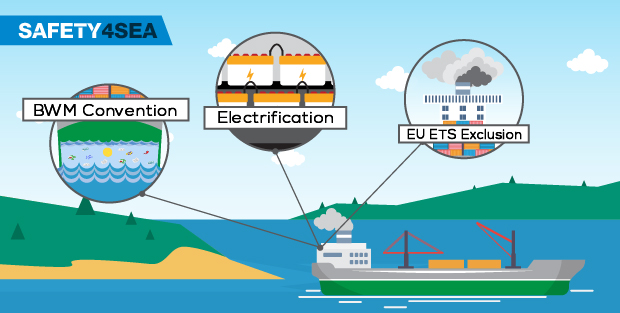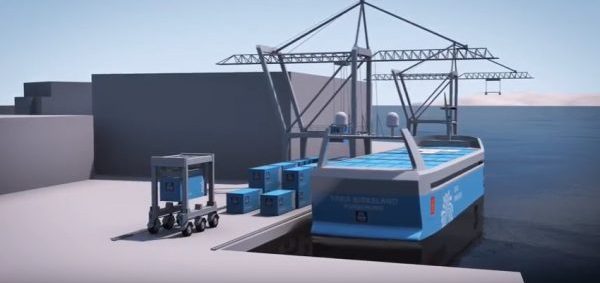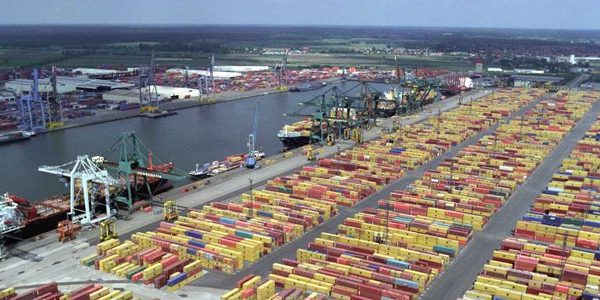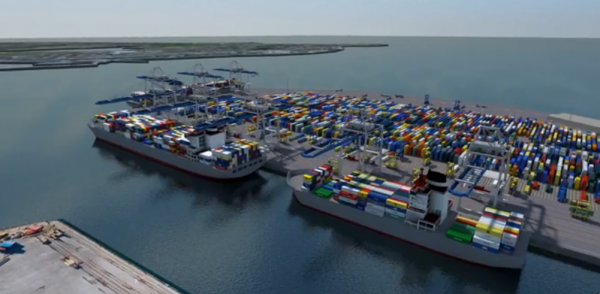As we are heading towards the end of 2017, we take a look back at the significant developments for the protection of the marine environment. The entry into force of the BWM Convention, the exclusion of shipping in the EU ETS, the initiatives towards electrification and decarbonization compile the scenery of a challenging year for shipping.
BWM Convention & MEPC 71

IMO’s MEPC 71th Session took place during the first week of July where significant decisions regarding the implementation of the BWM Convention were adopted and other topical environmental issues were also discussed. Just few months before its entry into force, IMO put under the microscope the Convention implementing amendments on its schedule which actually gained a deferral for existing ships. Also, the MEPC 71 focused on ways to fulfil its mandate to protect oceans and human health and to mitigate climate change, in line with the UN SDGs, particularly SDG 14 and SDG 13 concerning oceans and climate change, respectively.
MEPC 71 agreed amendments to Regulation B-3 of the BWM Convention to implement a new schedule for the D-2 requirements. The amendments delay the mandatory BWTS installation schedule for two years after entry into force, giving vessels 2 to 7 years before needing to fit a treatment system, depending on their IOPP renewal survey dates.
The proposed amendments arose mixed feelings among industry’s stakeholders: There were many who welcomed the decision, considering that it allows more time to shipowners to make decisions and to the market to benefit from a far more robust technology. On the contrary, there were many stakeholders who did not applaud the outcome. BWTS vendors expressed their disappointment over IMO’s decision because it actually elongates compliance plans up to seven years and disrupts the competition balance. Some NGOs saddened by the decision considering that the danger to the marine environment from harmful aquatic organisms and pathogens was largely neglected.
Now the industry is looking forward towards the MEPC 72 due in April 2018, in which pending issues will be discussed. IMO’s agenda for 2018 include draft amendments to the BWM Convetion and further new guidelines and recommendations on various topics, among other things.
[divider]
Shipping excluded from EU ETS
In November 2017, EU reached a provisional agreement to revise the EU ETS after 2020, giving time to the shipping industry to realize its initial CO2 reduction objectives by 2018, according to IMO’s Roadmap. Namely, the decision gives IMO time to adopt an initial strategy for comprehensive emissions reductions from ships in April 2018 and a final strategy in 2023.
Many industry bodies welcomed this decision by EU, which according to ICS, it demonstrates confidence within the EU institutions in the current progress being made at IMO to develop an ambitious CO2 strategy. ECSA and ESPO hailed it, noting that IMO is the organization to regulate the global industry. Danish Shipping said that this will pressure IMO to provide a strategy and the German Shipowners’ Association stressed that a global approach is the only solution to reduce CO2 emissions.
Shipping will be included in the EU ETS trading system until 2023, in case IMO’s negotiations on a CO2 strategy haven’t made sufficient progress.
[divider]
COP23 & shipping
The ‘Ambition 1.5oC: Global Shipping’s Action Plan’ summit at COP23 gathered 150-200 industry representatives and UNFCCC delegates, in order to take action and create an Action Plan for the decarbonisation of the shipping industry. The summit took place on 13 November 2017, in Bonn, onboard the RheinFantasie river vessel.
[divider]
One Planet Summit
On 12 December 2017, One Planet Summit addressed the ecological emergency for our planet by calling together in Paris international leaders and committed citizens from around the world.
On the sidelines of the summit, the so-called “Tony de Brum” declaration was signed by 35 states, including UK, France, Denmark, Germany, Canada, the Marshall Islands, Chile and New Zealand, under which shipping should adopt a cap on shipping CO2, with the ambition of reaching zero emissions towards the mid-century.
[divider]
China launched first electric ship
The world’s first 2,000-metric-ton fully electric cargo ship launched in Guangzhou, China, scheduled to operate along the inland section of the Pearl River Delta.
[divider]
World’s first floating wind farm started production

World’s first floating wind farm, Hywind Scotland started delivering electricity to the Scottish grid.
[divider]
CMA CGM in favour of LNG as a fuel
In November 2017, CMA CGM announced its decision to equip its 22,000 TEU giant containerships with LNG propulsion, becoming the first shipping company globally to equip giant containerships with this type of motorisation. With this move, the company anticipates 25% less CO2 emissions, 99% less sulphur emissions, 99% less fine particles and 85% less nitrogen oxides emissions.
[divider]
France, Germany and Malta jump on the LNG train
- France encourages ports to create the appropriate infrastructure, in order for ships to adopt the use of LNG.
- Germany promotes the upgrading and conversion of seagoing vessels to LNG.
- Malta investigates the potential of LNG as a marine fuel.
[divider]
Yara Birkeland
In May 2017, it was announced that the first commercial autonomous and zero ballast vessel in the world is on schedule. Yara Birkeland, for which Yara and Kongsberg joined forces, will transport about 25.000 containers per year, from Yara production plant to export container ports in Brevik and Larvik. The vessel will initially operate as a manned vessel in the latter half of 2018, moving to remote operation in 2019 and expected to be capable of performing fully autonomous operations from 2020.
[divider]
Sustainable Blue Growth Agenda for Baltic Sea launched
The European Commission issued a report, entitled “Towards an implementation strategy for the Sustainable Blue Growth Agenda for the Baltic Sea Region.”
[divider]
UN declares war on ocean plastic
UN Environment has launched an unprecedented global campaign in order to eliminate major sources of marine litter.
[divider]
Ports take initiatives
Ports of LA, Long Beach approve Clean Air Action Plan
The ports of Los Angeles and Long Beach announced the approval of the 2017 Clean Air Action Plan (CAAP) Update, to promote a zero-emission future.

Port of Rotterdam promotes cleaner shipping
The Port of Rotterdam has been quite active this year, taking a number of initiatives to promote cleaner shipping:
- Promotion of incentives for greener shipping
- Installation of new LNG bunkering station
- Expectations of no more noise pollution or air pollution and no negative environmental impact, until 2050.

Port of Amsterdam commits to reducing shipping emissions
Port of Amsterdam as well revealed plans to reduce shipping emissions and minimise environmental impact:
- Launch of Clean Shipping Vision for 2030
- Creation of ship-to-shore power project
Port of Antwerp invests in sustainability projects
The port of Antwerp will invest 1.4 million euros over the next three years in seven projects, to make the port more sustainable.
Auckland to become zero emissions port by 2040
To reduce the CO2 emissions, Ports of Auckland created an Emissions Management & Reduction Plan to enable the delivery of the long term goal of a zero emissions port by 2040.
[divider]
LNG in numbers

Gas Infrastructure Europe released the GIE LNG map and database for 2018
The LNG map is updated annually and for 2017 the following are the key facts:
- There are currently 32 LNG terminals in operation in Europe (27 in EU28), spread along the coasts of 15 countries (13 for EU28) and offering a total regasification capacity of 227 bcm/y (210 bcm/y for EU28).
- 11 LNG terminals are on the plans for Europe.
- In addition, 5 bcm/y are under construction in the EU.
- There are also several other projects, with however little indication on the progress.












































































